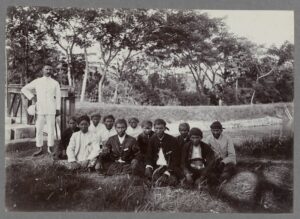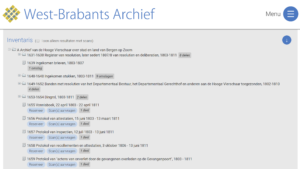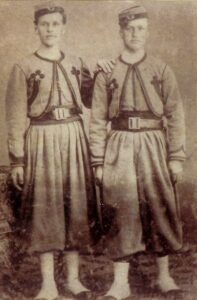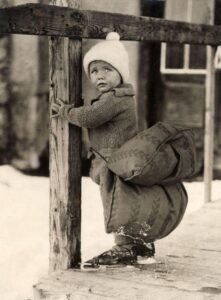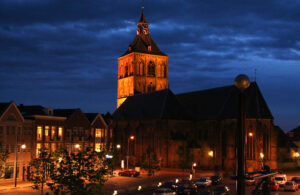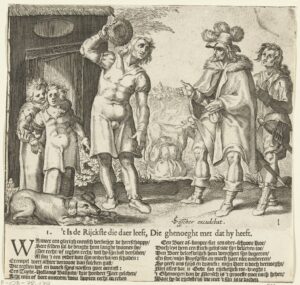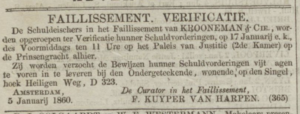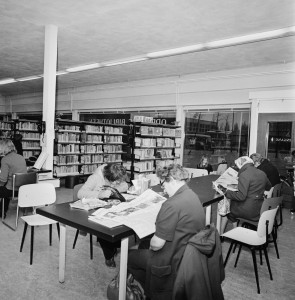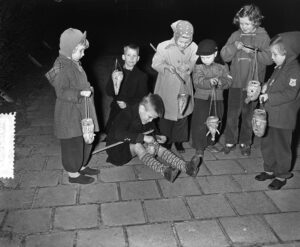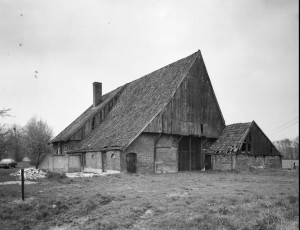An opzichter is an overseer. If you find that your ancestor was an opzichter, that can be a clue to find more records about him. Opzichters were hired by various organizations like hospitals or prisons. In former Dutch colonies, you can find overseers on plantations or managing enslaved people. The organizations the overseers worked for may have created records that shed more life on your ancestors' lives, or for the people they oversaw. If you are looking at a death record and the … [Read more...]
Dutch term – Archiefbeschrijving
An archiefbeschrijving is an archival description. To describe their holdings, archives create archival descriptions. Descriptions can be high-over ("incoming correspondence 1800-1810") or detailed ("accounts of the orphans of Laureijs Smulders, 1606"). Archival descriptions are typically organized per record group and published in the form of finding aids or catalogs. Most archives in the country have published their archival descriptions online. In a growing number of cases, scans are … [Read more...]
Dutch term – Zoeaaf
A zoeaaf is a zouave, a member of the infantry forces of the Papal states. In the mid 1800s, the Papal states were threatened by forces in Italy who wanted all the states to join under one nation. In 1860, pope Pius IX sent out a call to young unmarried Catholic men to join the infantry force and defend the papacy. The zouave papal infantry force existed from 1861 and 1870. The men volunteered for a period of two years, and some extended. In total, about 11,000 men enlisted with the … [Read more...]
Dutch term – Schaats
A schaats is a skate. Skating is a popular sport in the Netherlands, and has been for a long time. Many parts of the Netherlands are very boggy, and are drained by creeks and levies. In winter, skating was an efficient way to get around. When I was about ten years old, I'd skate to school if the weather allowed it. There were several ponds between me and my school. I'd bring skate protectors to walk from one pond to the other and would have my shoes in my backpack to wear in school. … [Read more...]
Dutch term – Feestdag
A feestdag (literally: feast day) is a holiday. Traditionally, feestdagen played an important role in our ancestors' lives, and not just the ones many of us know today like Christmas and Easter. Roman Catholic churches had patron saints. The holidays associated with these saints often remained important days for the town, even after the reformation in protestant areas. It might be the day of the annual fair, or when guilds held their elections. My home town of Oldenzaal has a basilica … [Read more...]
Dutch term – Baljuw
A baljuw [bailiff] was an official who represented the ruler of the region and had the highest jurisdiction. They usually received a fixed salary and a share of the fines. Other terms for this function are drost or drossaard. Baljuws were appointed by the ruler. You can sometimes find these appointments in the records created by the ruler, such as the lord of a domain or the count or duke of the province. … [Read more...]
Source – Bankruptcy files
If someone is unable to meet his financial obligations, the court can be asked to declare him bankrupt. The court appoints a curator who inventories the debts and assets of the bankrupt person, who the creditors are, and how they can best be paid. When everything is settled, which could take years, the bankruptcy is ended. Bankruptcy files Records are created of all the actions that happen after somebody is declared bankrupt. Together, these form a bankruptcy files. These files are part of the … [Read more...]
Dutch term – Studiezaal
The studiezaal is the reading room. Most archives in the Netherlands have a reading room. Opening hours may vary, some smaller reading rooms are open by appointment only. Thanks to large digitization projects and scanning on demand services, visiting reading rooms in person is often not necessary anymore since most of the research can be done online. Typical reasons for me to visit the reading room are: To access records at a small archive, that doesn't have a lot of information … [Read more...]
Dutch term – Sint Maarten
11 November is the feast day of Sint Maarten (Saint Martin). In some parts of the Netherlands, children go door-to-door holding night lights and singing songs. The neighbors would then give them treats. … [Read more...]
Dutch term: Eigenaar
An eigenaar is an owner. Up until recently, many people in the Netherlands did not own any real estate. They were tenants of farms, or rented a house. To find out whether your ancestors owned land, you can check death duties files, notarial records, court records, or cadastral records. For an example of research into property ownership, see Laurens Smulders. … [Read more...]
